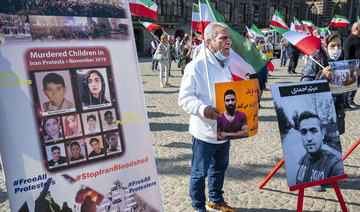NEW YORK: US intelligence officials believe Iran is plotting to kill the American ambassador to South Africa, Lana Marks.
They think she is being targeted as retaliation for the assassination in January of Gen. Qassem Soleimani, the commander of the Islamic Revolutionary Guard Corps’ (IRGC) Quds Force, in a drone attack ordered by the Trump administration.
Authorities first became aware of a general threat to Marks in the spring, but more specific details have reportedly emerged in recent weeks. US officials who have seen the intelligence reports told the Politico website that the 66-year-old is only one of a number of potential targets under consideration by Iran as payback for Soleimani’s death. They said her long friendship with President Donald Trump might be the main reason why she has been targeted by the Iranian government.
However, the location of her posting could also be a factor, according to Hussain Abdel Hussain, a writer and political analyst in Washington.
“The Iranian choice of the country (in which to plan an attack) depends on the reach of the IRGC’s network,” he said. “South Africa suffers one of the world’s highest crime rates, and this offers terrorist networks such as the IRGC fertile ground to grow, spread and use terror as a tool for projecting global influence.”
The US officials said staff at the Iranian embassy in Pretoria are involved in the plot to kill Marks. In a message posted on Twitter, officials at the embassy dismissed the accusation as baseless and promised a further response later.
Despite the plotting, any officially sanctioned attempt by Iran to kill Marks, or any other target, is unlikely, according to Abdel Hussain.
“Except for the missiles launched at Ain Al-Assad air base in Iraq (on Jan. 8, five days after Soleimani was killed), for which Iran … claimed responsibility, there has not been — and probably will not be — an Iranian retaliation that the regime publicly endorses (for) fear that it could provoke further US attacks on Iranian targets,” he said.
In 2015, details of leaked intelligence reports revealing a secret network of Iranian operatives in South Africa were published by Al-Jazeera and The Guardian newspaper. South Africa has, at times, advocated in favor of Iran.
In recent years, Iran has shied away from direct confrontation with the US, instead delegating such activity to its proxy militias in Iraq, where American diplomatic sites and personnel have been targeted at an increasing rate in the months following Soleimani’s death.
“Since Trump came to power, his policy of dealing with Iran has made it clear to the Iranians that America has erased the line (that distinguishes Iran from its proxies),” said Abdel Hussain. “This was the message behind the killing of Soleimani, and Iran is waiting Trump out in the hopes that a Democratic president will restore the distinction between Iran and its proxies, hence restoring Iran’s ability to project power globally.”
Iranian-backed militias continue to have the upper hand on the ground in Iraq. Their show of strength after Iraqi Prime Minister Mustafa Al-Kadhimi ordered the apprehension of militia members in late June, for example, forced him to release them within days.
However, according to Abdel Hussain: “Where Iran is losing in Iraq is with (the) majority of Iraqis, (who) have turned against Iran and its militias, burnt down Iranian consulates and torn down posters of the Iranian leader in Iraqi streets.
“Most remarkable was Sunday’s statement from (Iraq’s leading Shiite cleric Ali) Al-Sistani who, after meeting a top UN official in Iraq, called implicitly for disbanding the militias as a prerequisite for a free and fair election.”



























